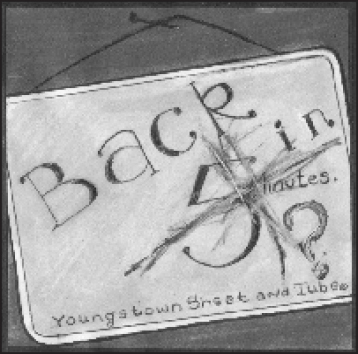If you really want to know what’s going on in a city, consult the motel clerk working the graveyard shift—not the clerk at the chain motel, but his counterpart at the inn that advertises the cheapest rates at the interstate exit with the truck stop. The kind of inn where you find cars patched with Bondo in the parking lot, mixed in among pickup trucks with utility boxes, plastic buckets, and waders. In Youngstown, Ohio, that would be somewhere along I-80 west of the Pennsylvania state line and east of the Warren-Ashtabula exit.
The clerk on the graveyard shift at our motel does not disappoint. “Our area’s economy,” he explains, “has been downsized, globalized, and sent offshore.”
Waitresses at 24-hour coffee shops are also excellent sources of information. They know more about the local economy than most economists employed by think tanks. Near the interstate, we sip our coffee and listen as our waitress explains, “Youngstown has never been the same since Campbell shut down.” She is referring to Youngstown Sheet and Tube Company’s Campbell Works on the east side, which closed in 1977, laying off 5,000 steelworkers. Her sentiments are confirmed by state and federal employment statistics, which reveal that manufacturing jobs in greater Youngstown declined under Democrats Jimmy Carter and Bill Clinton and Republicans Ronald Reagan, George H.W. Bush, and George W. Bush. Many in Youngstown have abandoned the two major political parties as the perception has grown that both of them abandoned Youngstown’s industrial economy, which once ranked third in U.S. steel production. Independent candidate H. Ross Perot won nearly one in four votes here in 1992, and voters elected maverick Democrat James Traficant to nine terms in the U.S. House of Representatives. Traficant, a critic of trade agreements with communist China, was expelled over corruption charges after a long battle with the IRS and the U.S. Department of Justice, and is now serving an eight-year sentence in federal prison. He once famously declared it had become easier to find Elvis than “to find a good factory job here in America.”
Though many in Youngstown have abandoned the two-party system, they have not forsaken their country, their faith, or their families. We see more American flags waving across Youngstown than fly over midtown Manhattan, as we spend a summer day crossing the Mahoning River, surveying the city’s post-industrial landscape. Many of the flags fly from the porches of small, wood-frame homes that housed several generations of steelworkers in ethnic neighborhoods, such as Brier Hill on the west side. We ask for directions at one point, and an elderly gentleman, a retired steelworker, directs us to Interstate 670, from which we catch a glimpse, in the late-morning sun, of Holy Trinity Romanian Orthodox Church, which will celebrate its 100th anniversary next year. These images are a reminder that these Eastern and Southern European immigrants believed in assimilation, citizenship, and the American melting pot.
Karin Gundish’s How I Became an American (Cricket Books, 2001) describes Youngstown at the beginning of the 20th century through the eyes of ten-year-old Johann and his family of German immigrants trying “to make a new life as Americans.” Laboring in Youngstown’s steel mills was tough, including 24-hour shifts some weekends. Gundish writes, “In the steel mills, one’s life isn’t out of danger for a single minute: ‘All you’re allowed to do is work all the time, and above all you have to stay healthy so that your eyes can keep working.’” The steelworkers put in long, hard hours to support their families without surrendering to Mammon. Indeed, the preacher in Gundish’s novel asks, “[D]oesn’t it harm life, if one uses one’s lifetime only to make money?” That idea is not shared 405 miles to the northeast in the financial center that gave the New York Central Railroad, one of four that meet in Youngstown, its name.
The steelworkers named the blast furnaces along the Mahoning Valley after women. In front of us is the site where the oldest U.S. blast furnace, Jeannette, once stood at the Brier Hill Plant of Youngstown Sheet and Tube. Bruce Springsteen immortalized “Jenny” in his 1995 song “Youngstown,” but songs and sentiments will not bring back manufacturing jobs to the Mahoning Valley. At its peak, there were nearly 100,000 such jobs in the area; today, there are barely 40,000. Flawed fiscal, regulatory, trade, and monetary policies have all contributed to manufacturing’s decline in Youngstown and other once-great industrial cities across the United States. For much of the postwar era, many Democrats wrongly assumed that domestic steel companies would always remain competitive, despite the increasing burdens placed on them by government. Harry Truman went so far as to attempt to seize the nation’s steel mills, until the owners of one Youngstown mill won their case against him before the U.S. Supreme Court. John F. Kennedy clashed with “Big Steel,” and it is doubtful that Carter or Clinton thought that Vulcan meant anything more to the people of Birmingham, Alabama, than a race of aliens on Star Trek. Neither of these Southern Democrats had much to say about the steel industry during their tenures in the White House. The blind spot of many Republicans, by contrast, is their failure to understand that the long-term loss of manufacturing jobs inevitably leads to a greater role for government and a bigger welfare state. Some institution has to provide those pensions and healthcare benefits, and, if it isn’t a generous employer, it will be federal legislators, who are always generous with taxpayer money when campaign season rolls around.
Back at the 24-hour coffee shop, another waitress defines the problem more clearly as she warms our brew: “Whatever the government’s doing, it’s not working.” The clerk on the graveyard shift is more succinct. Eyeing the dirty bottom of the motel’s only Java Cow and its (presumably) day-old contents, he asks, “Does the government even care?”

Leave a Reply